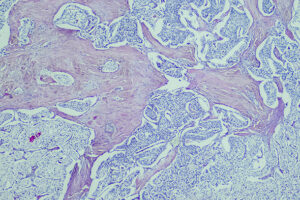Oncology
Gastroenteropancreatic Neuroendocrine Tumors
Gastroenteropancreatic Neuroendocrine Tumors: Clinical Trials in Progress
There are many recently completed and ongoing clinical trials in the field of gastroenteropancreatic neuroendocrine tumors (GEP-NETs), including the NETTER-2 trial. At the 2024 ASCO Gastrointestinal Cancers Symposium, investigators presented pivotal clinical trial data from this important study.
Following these proceedings, featured expert Timothy J. Hobday, MD, was interviewed by Conference Reporter Editor-in-Chief Tom Iarocci, MD. Dr Hobday’s clinical perspectives on these findings are presented here.
Reflecting on my clinical practice spanning more than 2 decades, it is remarkable that there used to be a sense that we would not be able to cooperate nationally or globally to execute well-powered, randomized clinical trials because GEP-NETs were too rare. There were very few targets for therapy or intervention. But over the past decade or so, many well-powered, randomized clinical trials have been conducted that have revolutionized the evidence base and progress in NETs. Because NETs can generally be an indolent disease for many patients, it is difficult to sufficiently power trials for overall survival (OS). However, we need to always remember that improving life span and quality of life should be the main goals of any therapeutic intervention for our patients with metastatic NETs.
One of the great challenges in our field right now is defining the optimal peptide receptor radionuclide therapy (PRRT) strategies and sequencing with other therapeutic interventions for our patients. We know from the NETTER-1 trial that PRRT improved median progression-free survival (PFS) compared with high-dose octreotide in patients with small intestinal primary NETs after progression on standard-dose octreotide in the first line. In the long-term follow-up, there was a numerically longer—but not statistically significant—OS benefit with PRRT; however, the study was not powered for OS.
I think that the most important clinical trial presented at the 2024 ASCO Gastrointestinal Cancers Symposium, or really from anywhere recently, is the NETTER-2 trial (abstract LBA588). NETTER-2 is a trial of first-line therapy for well-differentiated GEP-NETs, either grade 2 or 3 with a Ki-67 of greater than 10%. The rationale for first-line therapy is that these patients are felt to have more aggressive disease. There was a very impressive improvement in PFS and objective response rate in NETTER-2. The hazard ratios for PFS in the pancreas, nonpancreas, and small intestine were all in the same neighborhood, but researchers did not report response rates by primary tumor site. The time to deterioration in quality of life was similar between the 2 arms.
NETTER-2 can be criticized for its design, as the control arm of octreotide 60 mg long-acting release every month is not a standard initial therapy for GEP-NETs. In addition, patients with different primary tumor sites were enrolled in one trial, even though small intestinal NETs and pancreatic NETs are clinically different and distinct diseases. But the results of NETTER-2 are still interesting and important.
It is not at all clear that giving PRRT earlier is better than using it a little later in the disease course. Some people feel that there is an increased risk for therapy-related myeloid neoplasms in patients who have received prior chemotherapy, so we should use PRRT before chemotherapy. The intergroup trial A022001 (also known as the ComPareNET trial), which is led by the Alliance for Clinical Trials in Oncology, will randomize patients to either chemotherapy with capecitabine plus temozolomide or PRRT with 177Lu-dotatate for pancreatic NETs and may give some insight into this question with long-term follow-up. However, no patients had received prior chemotherapy in the NETTER-1 trial, but they still had a 2% to 3% risk of myelodysplastic syndromes after 2 years, which has a very poor prognosis. NETTER-2 allows for a crossover from the octreotide arm to PRRT second line, and I think that one value of this trial is that we will learn whether waiting and using PRRT in the second line, or even later, works just as well.
In addition, it is important to consider that patients with well-differentiated grades 2 and 3 disease can have a relatively indolent disease course and, therefore, may respond to less aggressive therapies and may have disease control for long periods of time. In the NETTER-2 trial, the median PFS was 8.5 months in the octreotide arm, which means that a number of patients had controlled disease for well over 8 months (abstract LBA588). For my patients, I only consider upfront PRRT if I feel like the patient’s disease burden, symptoms, or pace of disease are such that I need a response or a regression of disease to try to improve or prevent symptoms.
I am involved with the ComPareNET trial evaluating capecitabine plus temozolomide vs 177Lu-dotatate in patients with advanced pancreatic NETs. The activity of PRRT in pancreatic NETs is an important area of interest to the leadership of the Neuroendocrine Tumors (NET) Task Force within the National Cancer Institute (NCI) Gastrointestinal Steering Committee because patients with pancreatic NETs were excluded from the NETTER-1 trial. Further, patients for whom we would consider PRRT are also the patients who often have the option of using capecitabine plus temozolomide, our standard chemotherapy option. We know that both PRRT and chemotherapy are active therapies, but we do not know which therapy is more effective. So, we are comparing their efficacy and long-term safety, and we hope to gain insight into whether their sequence matters. That trial is open in the United States, and we would encourage people to support it so that we can answer that question as best we can.
Other important ongoing trials relate to the role of repeat PRRT therapy and the exciting potential future innovation of alpha-particle PRRT. There is a significant unmet need for patients who have good disease control with PRRT for 1 or 2 years, or even longer sometimes, but subsequently are progressing. The NET RETREAT trial is evaluating retreatment with 177Lu-dotatate vs everolimus, and the ACTION-1 trial is looking at the alpha-emitting radiopharmaceutical therapy RYZ101 vs standard of care.
Finally, the last important trial that I want to highlight is S2104, a trial of adjuvant chemotherapy in resected pancreatic NETs. Every other solid tumor in oncology has had a well-powered randomized trial of chemotherapy vs observation, and normally there is either a small or a significant benefit to adjuvant chemotherapy. A group led by Heloisa P. Soares, MD, PhD, and SWOG Cancer Research Network and open through the NCI intergroup mechanism is conducting the S2104 trial, which is studying patients who have resected pancreatic NETs that are judged to be at significant risk of recurrence after complete resection. It is randomizing patients 2:1 to adjuvant capecitabine plus temozolomide vs observation. This is the most important currently ongoing trial, and we need to make sure that it is highlighted and supported, and that surgeons and medical oncologists know about it, because adjuvant therapy can cure patients. None of these other trials are curing patients, so I really want to highlight the S2104 trial and raise awareness that this trial is in progress.
Chauhan A, O’Callaghan C, Myrehaug S, et al. NET RETREAT: a phase II study of 177Lutetium-dotatate retreatment vs. everolimus in metastatic/unresectable midgut NET [abstract T-11]. Abstract presented at: North American Neuroendocrine Tumor Society 2023 Multidisciplinary NET Medical Symposium; October 4-6, 2023; Montreal, Quebec.
ClinicalTrials.gov. Comparing capecitabine and temozolomide in combination to lutetium Lu 177 dotatate in patients with advanced pancreatic neuroendocrine tumors. Updated November 1, 2023. Accessed February 14, 2024. https://clinicaltrials.gov/study/NCT05247905
Hope TA, Halperin D, Strosberg J, et al. ACTION-1: a randomized phase Ib/3 trial of RYZ101 compared with SoC in SSTR+ well-differentiated GEP-NET with progression following Lu-177 SSA [abstract T-1]. Abstract presented at: North American Neuroendocrine Tumor Society 2023 Multidisciplinary NET Medical Symposium; October 4-6, 2023; Montreal, Quebec.
Kunz PL, Graham NT, Catalano PJ, et al. Randomized study of temozolomide or temozolomide and capecitabine in patients with advanced pancreatic neuroendocrine tumors (ECOG-ACRIN E2211). J Clin Oncol. 2023;41(7):1359-1369. doi:10.1200/JCO.22.01013
Singh S, Halperin DM, Myrehaug S, et al. [177Lu]Lu-DOTA-TATE in newly diagnosed patients with advanced grade 2 and grade 3, well-differentiated gastroenteropancreatic neuroendocrine tumors: primary analysis of the phase 3 randomized NETTER-2 study [abstract LBA588]. Abstract presented at: 2024 American Society of Clinical Oncology Gastrointestinal Cancers Symposium; January 18-20, 2024; San Francisco, CA.
Soares HP, Guthrie KA, Ahmad SA, et al. Randomized phase II trial of postoperative adjuvant capecitabine and temozolomide versus observation in high-risk pancreatic neuroendocrine tumors: SWOG S2104 [abstract TPS515]. Abstract presented at: 2022 American Society of Clinical Oncology Gastrointestinal Cancers Symposium; January 20-22, 2022; San Francisco, CA.
Strosberg J, El-Haddad G, Wolin E, et al; NETTER-1 Trial Investigators. Phase 3 trial of 177Lu-Dotatate for midgut neuroendocrine tumors. N Engl J Med. 2017;376(2):125-135. doi:10.1056/NEJMoa1607427
Strosberg JR, Caplin ME, Kunz PL, et al; NETTER-1 Investigators. 177Lu-Dotatate plus long-acting octreotide versus high‑dose long-acting octreotide in patients with midgut neuroendocrine tumours (NETTER-1): final overall survival and long-term safety results from an open-label, randomised, controlled, phase 3 trial [published correction appears in Lancet Oncol. 2022;23(2):e59]. Lancet Oncol. 2021;22(12):1752-1763. doi:10.1016/S1470-2045(21)00572-6
This information is brought to you by Engage Health Media and is not sponsored, endorsed, or accredited by the American Society of Clinical Oncology.










